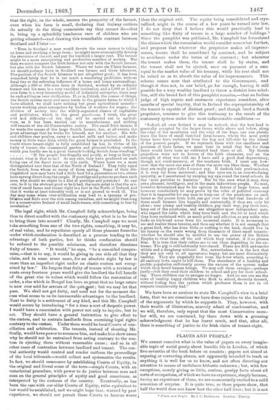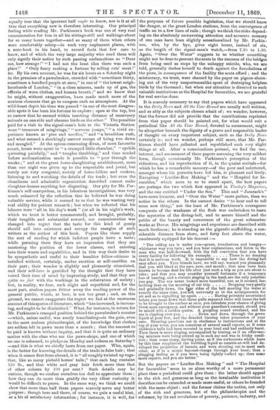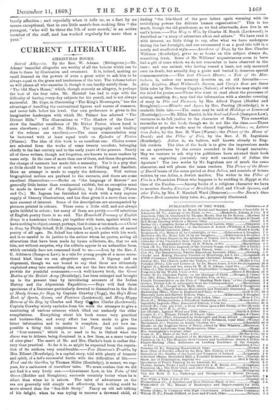PLACES AND PEOPLE.* WE cannot conceive what is the value
of papers on every imagin- able topic of social gossip about humble life in London, of which five-sevenths of the book before us consists ; papers not aimed at exposing or correcting abuses, not apparently intended to teach us anything it is well for us to know, and not often directing our attention to means of usefulness hitherto unknown ; but, with few exceptions, merely giving us little, curious, gossipy facts about all sorts of occupations, of which we have no experience, simply because, having no experience of them, we are momentarily excited to a mild sensation of surprise. It is quite true, as these papers show, that half the world does not know how the other half lives ; but it is not
Places and People. By J. C. Parkinson. London : Tinsley. equally true that the ignorant half ought to know, nor is it at all true that everything new is therefore interesting. Our principal feeling while reading Mr. Parkinson's book was one of very real commiseration for him in all his sittings-still and walkings-about for so many hours together—and so many of them when others were comfortably asleep—in such very unpleasant places, with a note-book in his hand, to record facts that few care to know, and of which the very large majority who read them will only signify their notice by such passing exclamations as "Dear me, how strange !" "I had not the least idea there was such a place!" "Only fancy making a fortune by selling cats' meat !" &c. By his own account, he was for six hours on a Saturday night in the premises of a pawnbroker, crowded with "sometimes thirty, sometimes a hundred people at once," in one of "the lowest neigh- bourhoods of London," "in a close miasma, made up of gas, the effluvia of worn clothes, and human breath ;" and we know that he might, without exaggeration, have made much more of the noxious elements that go to compose such an atmosphere. At the wild-beast depot his time was passed "in one of the most disagree- able spots it has been his fortune to explore ; open at the top, but so narrow that he seemed within touching distance of unsavoury animals on one side and obscene birds on the other." The penalties paid for a visit to the signal-man's hole at the Victoria Station were " tremours of misgivings," "nervous jumps," "a vivid ex- perience known as pins and needles,'" and "a breathless rush, and what seemed a shockingly narrow escape of being run down and mangled." At the opium-consuming divan, of most favourite resort, hours were spent in "a cramped little chamber," "eyelids quivering painfully," and "temples throbbing," and time needed before acclimatization made it possible to " peer through the smoke ; " and at the great horse-slaughtering establishment, more than one night was given up to the respectable and jovial, but surely not very congenial, society of horse-killers and cookers, listening to and watching the details of the trade ; but even the cleanliness and admirable organization described cannot make slaughter-houses anything but disgusting. Our pity for Mr. Par- kinson's self-martyrdom, in his laborious investigations, was very much enhanced by the reflection that he believed he was doing valuable service, while it seemed to us that he was wasting very real ability for patient research ; but when we reflected that his labours were "all in his day's work" (or all in his night's work, which we trust is better remunerated), and brought, probably, their tangible and substantial reward, our commiseration was changed into regret that the taste for this kind of gossip should call into existence and occupy the energies of such writers as the author of this book. Papers like these supply the sort of reading for which indolent people have a taste ; while perusing them they have an impression that they are mastering the position of the lower classes, and entering into their wants and capabilities, and in this way their desire to be sympathetic and useful to their humbler fellow-citizens is satisfied without, certainly, undue exertion or self-sacrifice on their part ; their wonder is slightly and pleasantly stimulated, and their self-love is gratified by the thought that they have raised their tone of mind by improving study, and that they are quite an fait with the workings in the substratum of society ; but, in reality, we fear, such slight and superficial and, for the most part, aimless papers fritter away the reading power of the general public, which, at best, is not too great ; and, on this ground, we cannot exaggerate the regret we feel at the enormous amount of this species of literature, which "has increased, is increas- ing, and ought to be diminished." What, for instance, in return for Mr. Parkinson's cramped position behind the pawnbroker's counter —which, unless useful, was surely humiliating—is the gain, even to the most zealous philanthropist, of the knowledge that clothes are seldom left in pawn more than a month ; that the amount to be paid is known without inquiry, and that it is quite an ordinary matter with the class who use the pawn-shops, and one of which no one is ashamed, to pledge on Monday and redeem on Saturday? —and this is what we chiefly learn from one paper. Who, again, is the better for knowing the details of the trade in false hair ; that when it comes first from abroad, it is " all roughly twisted up toge- ther, like so many piebald horses' tails ;" that each bag contains 150 lb., and that white and gray hair fetch more than that of other colours by 100 per cent? Such details may be curious, though we confess ourselves too dull to appreciate them ; how they can do more than gratify the very idlest curiosity it would be difficult to prove. In the same way, we think we could show that more than half these papers scarcely serve any better purpose ; though here and there, of course, we gain a useful hint, or a bit of satisfactory information ; for instance, it is well, for
the purposes of future possible legislation, that we should know the danger, at the great London stations, from the convergence of traffic on to a few lines of rails ; though we think the risks depend- ing on the absolutely unwavering attention and accurate memory of one man have been slightly sensationalized by Mr. Parkin- son, who, by the bye, gives eight hours, instead of six, as the length of the signal-man's watch,—from 7.30 to 1.30. Again, "Over the Water" suggests to us whether something might not be done to prevent the seats in the recesses of the bridges from being used as steps by the unhappy suicide, who, we are told, generally dashes herself to death against the foundations of the piers, in consequence of the facility the seats afford ; and the aristocracy, we trust, were shamed by the paper on pigeon-shoot- ing out of the very unsportsmanlike sport of destroying helpless birds by the thousand ; but when our attention is directed to such valuable institutions as the Hospital for Incurables, we are grateful for real service done.
It is scarcely necessary to say that papers which have appeared in the Daily News and All the Year Round are usually well written, and as ably as the subjects chosen admit of ; we wonder, however, that the former did not provide that the contributions reprinted from that paper should be pointed out, for what would suit a periodical like All the Year Round, devoted to amusement, might be altogether beneath the dignity of a grave and responsible leader of thought on every important subject, such as the Daily News- certainly is ; and we wonder, perhaps still more, that Mr. Par- kinson should have collected and republished such very slight things at all. After a conscientious perusal, we find the use, interest, and amusement of these papers assuming the very mildest form, though occasionally Mr. Parkinson's perception of the ridiculous, and his reproduction of it, in the quaint recitals—for which he has a remarkable memory—of the poor and unlettered, amongst whom his pursuits have led him, is pleasant and lively.. Excepting "Lucifer-Box Making" and the "Hospital for In- curables," which seem to us to stand apart, the best papers are perhaps the two which first appeared in Tinsley's Magazine,. and the one entitled "Under the Sea." This and " Jamrach's " have more humour, and "Over the Water" more pathos, than we notice in the others. In the earnest desire "to hear and to tell some new thing," not the least of Mr. Parkinson's courageous conquests of the weakness of the flesh was undertaken to learn the mysteries of the diving-bell, and to assure himself and the public of the beauty and correctness of the great submarine works at Dover. His misgivings and experience are described with much liveliness ; he is standing on the gigantic scaffolding, a con- siderable distance from shore, and forty feet above the water, cumbrously equipped for his descent :— "The rolling sea is under you—green, treacherous, and hungry— whichever way you turn ; and you hear explanations, and listen to the man who was half-drowned, with the full conviction that you have every facility for following his example There is no denying that it is nervous work. It is impossible to say how the diving-bell may affect you. Your friends have, we will say, warned you pleasantly that you will bleed at the ears, nose, and mouth ; that men have been known to become deaf for life after just such a trip as you are about to take ; and that you may consider yourself fortunate if a temporary loss of hearing, and a chronic singing in the head, are the only penalties you pay. The sea never looked more beautiful, nor, as it seemed, less
inviting than on the morning of our trip Dropping very gently and gradually down, the for sides of the bell meeting the water at exactly the same time, you ask nervously as to the arrangements for
air and as to signalling up again Having privately ascertained before you came down that three pulls repeated twice will cause the bell to be brought to the surface at once, you calculate your chance of giving these upon emergency, and without your guardian's consent, should you be seized with a sudden qualm. A gurgling sound overhead, and the sea is rippling over you Down and down, through the green liquid at your feet, and the dreaded buzzing takes possession of your ears. Shouting questions out in obedience to instructions and at the top of your voice, you are conscious of several small reports, as if some children's balls had been secreted in your head and had suddenly burst. Then there is more singing, accompanied by hissing, as if an effervesc- ing mixture were being stirred up in each ear and was in frisky condi- tion; then some sharp, darting pains, as if the corkscrews which have by this time supplanted the babbling liquid as tenants-at-will had de- veloped the properties of lancets, and were shooting out to meet each other, as if in a mimic bayonet-charge through your head; then a plugging feeling as if you were being tightly corked up; then some more reports, and you are better."
But the papers on "Lucifer-Box Making" and "The Hospital for Incurables" seem to us alone worthy of a more permanent place than a periodical could give them : the latter should appeal to the rich and generous as long as the invaluable institution it describes can be extended or made more useful, or others be founded with the same object ; and the former claims the notice, not only of the rich and generous, but of the philanthropist and the reformer, by its sad revelations of poverty, patience, industry, and
family affection ; and especially when it tells us, as a fact by no means exceptional, that in one little match-box-making firm "the youngest, who will be three the 7th of next month,' is an active member of the staff, and has worked regularly for more than a year."








































 Previous page
Previous page